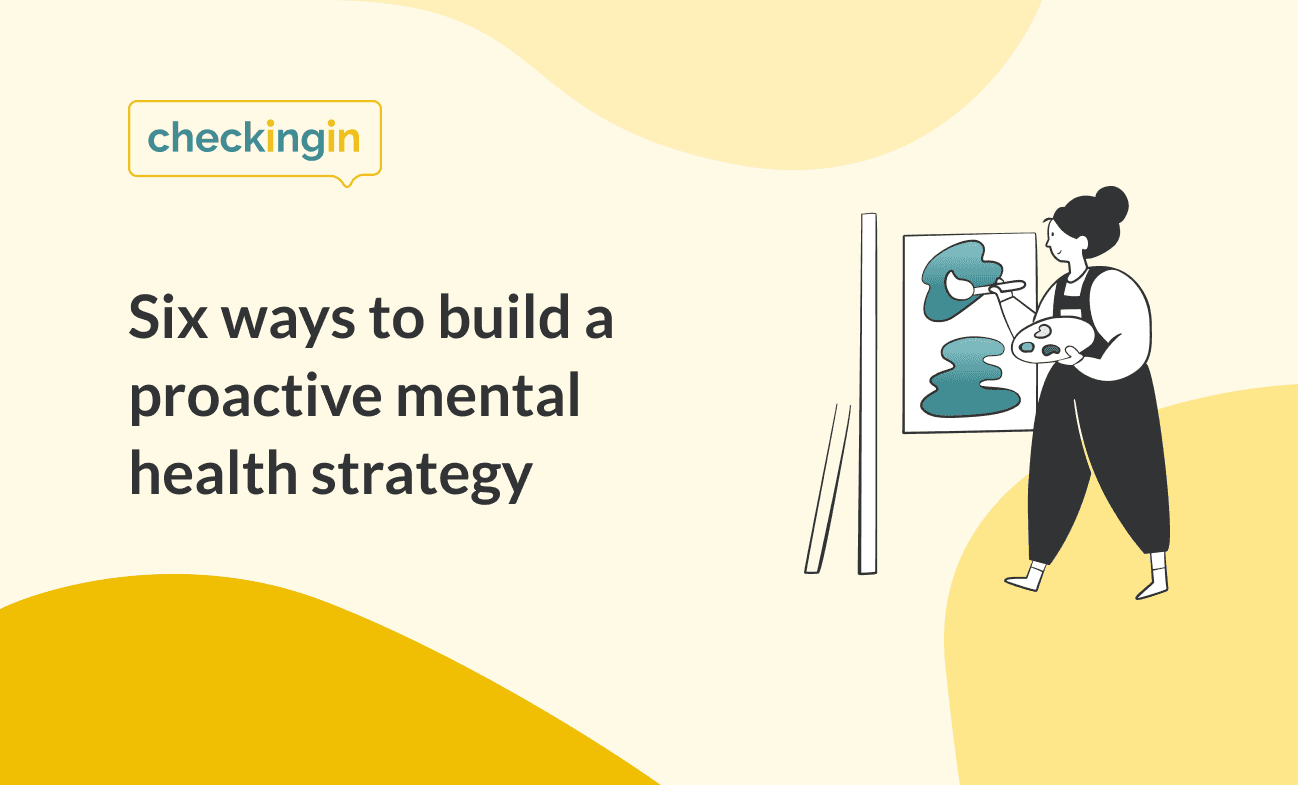Six ways to build a proactive mental health strategy
September 29, 2021by Molly Johnston in Tips & Tools
Covid-19 took everyone by surprise. Few people could have predicted that by mid-March 2020, we’d all be huddled inside, baking bread and hosting Zoom parties. Most organizations were also caught off guard by the pandemic’s effects on employee mental health.
Covid-19 took everyone by surprise. Few people could have predicted that by mid-March 2020, we’d all be huddled inside, baking bread and hosting Zoom parties. Most organizations were also caught off guard by the pandemic’s effects on employee mental health.
Across industries, companies wisely added new benefits and re-considered their workforce mental health supports. They knew people were stressed, anxious, and burnt out – and they acted fast. HR responses were necessarily reactive. The pandemic continues, but now organizations have the opportunity to develop and implement a more proactive mental health strategy.
What does it mean to be proactive?
A proactive approach focuses on prevention. It features tools, strategies, and programs designed to help people feel and stay well, like daily meditation. This can overlap with early intervention, which identifies symptoms before they become more serious or chronic, such as screening for depression.
A reactive approach treats embedded problems. We couldn’t prevent Covid-19, so we reacted as best we could. If an employee is unable to work due to mental illness, that becomes a reactive situation. To be clear, many mental health issues cannot be prevented or predicted – and blame should never be part of the conversation. The point is to minimize the need for reactive care, whenever possible.
A proactive mental health strategy is like making regular deposits in a bank account; the practice keeps your finances healthy and when tough times hit, you have significant resources to draw from. That’s what a preventative approach can do for both individuals and organizations.
Here are six ways to help your company shift from reactive to proactive.
1. Simplicity
People are more likely to embrace benefits when they’re simple and approachable. Confusing rules or policies can prevent employees from taking advantage of even the best mental health programs. Evidence also shows that people living with mental illnesses, such as depression or bipolar disorder, may struggle to complete seemingly simple tasks like doing laundry. Complicated programs may unintentionally create barriers for the people who need them most.
2. Brevity
Busy people need quick mental health tools – and we’re all busy. There isn’t always time to write in a journal or attend a spin class. Just like brushing your teeth, quick steps and daily practices can also promote wellness. Look for lightweight options to support your team’s mental health and supplement more intensive tools such as counselling sessions.
3. Clarity
What is mental wellbeing? How do I improve it? How does this program work?
Mental health can be confusing. And it can be tough to know what helps and what doesn’t. That’s why clarity is essential. Communicate your benefits as precisely as possible. Repeat and reinforce them often so people know what’s available. The tools you provide should also be straightforward. Make sure employees don’t have to wade through complicated materials or jargony language fit for a medical textbook.
4. Diversity
Far-reaching support is key to a proactive mental health strategy. It’s impossible to know what works for different people, so a comprehensive approach should address the eight elements of wellness: emotional, physical, environmental, intellectual, occupational, spiritual, financial, and social. CheckingIn, for example, incorporates all of these elements in our mobile app, monthly programs, workshops, and platform integrations.
5. Accessibility
According to the American Psychiatric Association, more than half of people with mental illness don’t receive help for their disorders. Awareness and efforts to normalize mental health have grown over the past several years, but stigma persists. Some people also experience self-stigma; they feel shame about their struggles or delay treatment. That’s why proactive support is essential. Look for programs that your teams can access anywhere, anytime. Digital tools and platforms are also increasingly important, given the shift to remote work and a higher proportion of digital natives in the workforce.
6. Insights
It’s difficult to provide effective support if you don’t know how people feel – and privacy concerns can make it difficult to ask the right questions. The CheckingIn dashboard gives you a real-time snapshot of team sentiments, trends, and engagement. All data is anonymized for individual privacy, but aggregated insights can help you make informed decisions, like diverting resources or adding supports. Tracking hotspots early on can also help you understand why some teams are thriving, for example, while others are merely surviving. Whatever benefits you provide, look for solutions that provide flexibility and confidential, yet actionable data.
To learn more or to request a demo, please contact us directly at info@checkingin.co. We’d love to hear from you.

